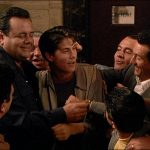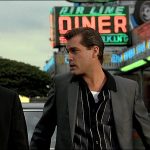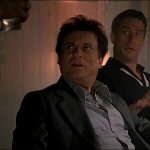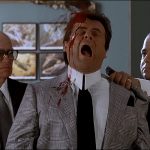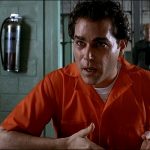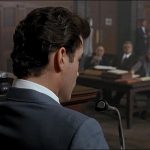
Goodfellas – 1990
Goodfellas was a better movie than I expected. The problem wasn’t the movie, it was my expectations. I was expecting a cookie-cutter, predictable film. I expected the performances to be over the top and the story to be somewhat farcical. But it was much more complex, and interesting than I thought it would be. There was subtlety, humor, and a bit of emotion. And for me, the most interesting part of the film was the fact that it was told from the perspective of a gangster who really loved being a bad guy.
The main character is Henry Hill, played by Ray Liota. He provides a lot of narration that was good narration, in that it wasn’t blatant exposition that propelled the story. It was narration that was told from a first person perspective, developing his character but letting the viewer hear his inner thoughts and feelings. And it wasn’t until the end of the movie that I learned that it wasn’t simply his inner monologue. The narration was actually a deposition, of sorts. Henry Hill was telling the story of his career as a criminal with an air of fond remembrance and nostalgia. He was in a witness protection program, and was no longer living a life of crime. And it was clear that he missed it. Such an interesting point of view.
Add to that the fact that it was based on a true story, and you have a very interesting peek into the mind of a bad guy. He would continually go on about how much he loved the fast and dangerous life, the thrill of theft and high-stake heists. He remembered his fellow gangsters with affection. He loved the money and the women. He loved the respect and the freedom to do anything he wanted. Sure, he had to work with psychopaths and murderers, but it was a small price to pay for all the glory and benefits of a life of organized crime.
I loved the scene in which a young Henry is released from his first arrest. He feels like he has failed because he got caught selling stolen cigarettes, but when he exits the courtroom, he is greeted by all his fellow gangsters with smiles and hugs. The big boss, Paulie Cicero, wonderfully played by Paul Sorvino, spreads his arms and says, “Hey! You popped your cherry!” I had to laugh out loud for that one.
Now, Ray Liota did a great job, there is no doubt. Especially in the later scenes when his cocaine addiction started becoming a problem. But it was really Henry’s partner, Tommy DeVito, played by Joe Pesci, who really stole the show. Tommy was a killer, through and through. He murdered without a conscience. He shot people on whims. He had a deep psychological fear of being laughed at, and anybody who made fun of him in any way usually ended up dead. The part seemed to have been made for Pesci. He was so incredibly suited to the role. He was sometimes hard to watch. He made me uncomfortable, which is exactly what he was supposed to do. He was supposed to be scary and Pesci played it brilliantly. The iconic “Are you laughing at me?” scene was a lesson in dangerous tension.
The film’s other big name was Robert De Niro, Playing Henry and Tommy’s boss, Jimmy Conway. Again, De Niro seemed to be a natural at playing the part of a gangster. There is a natural toughness about him that is so believable on the screen. His character was just as much of a killer as Tommy, but unlike that psychopath, he was not so ruled by his emotions. He had a brain, but he also had a temper when his orders were disobeyed.
And, of course, I would be remiss if I didn’t mention Henry’s wife Karen, played by Lorraine Bracco. In fact, there were plenty of times when she would take over the narration, which made sense because she had to go into the witness protection program with her husband. She was also perfectly cast. She looked good and though she started off as an innocent woman, she had her dark side. It was very telling about her character that when she first saw Henry use a gun to beat the crap out of someone who had hurt her, she said, “I know there are women, like my best friends, who would have gotten out of there the minute their boyfriend gave them a gun to hide. But I didn’t. I got to admit the truth. It turned me on.”
But if Henry was such a successful gangster, why were he and his family in the witness protection program? Well, his cocaine habit had gotten him into trouble and after Tommy had gotten himself whacked, Jimmy put a price out on Henry’s head. So he did the only thing he could do. He made a deal with the cops that put Jimmy and Paulie behind bars for the rest of their lives. He testified against them in court. And because he was the gangster that never actually murdered anybody, he was given a full pardon and the chance to disappear.
I’m still not a huge fan of movies that are overtly violent, and this movie certainly had its intense and gruesome scenes. But Goodfellas impressed me with the great characters and its smart script. Martin Scorsese, the movie’s director, did a good job and gave us a pretty well-made and memorable film.

